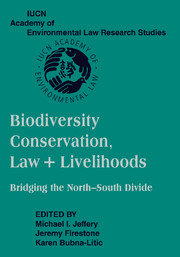 Biodiversity Conservation, Law and Livelihoods: Bridging the North-South Divide
Biodiversity Conservation, Law and Livelihoods: Bridging the North-South Divide Book contents
- Frontmatter
- Contents
- Acknowledgments
- Message from Kofi A. Annan, Secretary-General of the United Nations
- Macquarie Statement
- Contributors
- Introduction
- PART ONE THE CONTEXT
- PART TWO BIODIVERSITY: ITS CONSERVATION
- PART THREE CONSERVATION MEASURES
- PART FOUR USES OF COMPONENTS OF BIODIVERSITY
- PART FIVE PROCESSES AFFECTING BIODIVERSITY
- PART SIX BIOSECURITY ISSUES
- PART SEVEN ACCESS AND BENEFIT-SHARING
- 28 Access, Obligations, and Benefits: Regulating Bioprospecting in the Antarctic
- 29 Biotechnological Innovations, Genetic Resources, and Traditional Knowledge: Current Developments at the World Intellectual Property Organization
- 30 Sharing All the Benefits: The Challenge of Legal Recognition of Indigenous Intellectual and Cultural Property Rights in the Fiji Islands
- Index
29 - Biotechnological Innovations, Genetic Resources, and Traditional Knowledge: Current Developments at the World Intellectual Property Organization
Published online by Cambridge University Press: 31 July 2009
- Frontmatter
- Contents
- Acknowledgments
- Message from Kofi A. Annan, Secretary-General of the United Nations
- Macquarie Statement
- Contributors
- Introduction
- PART ONE THE CONTEXT
- PART TWO BIODIVERSITY: ITS CONSERVATION
- PART THREE CONSERVATION MEASURES
- PART FOUR USES OF COMPONENTS OF BIODIVERSITY
- PART FIVE PROCESSES AFFECTING BIODIVERSITY
- PART SIX BIOSECURITY ISSUES
- PART SEVEN ACCESS AND BENEFIT-SHARING
- 28 Access, Obligations, and Benefits: Regulating Bioprospecting in the Antarctic
- 29 Biotechnological Innovations, Genetic Resources, and Traditional Knowledge: Current Developments at the World Intellectual Property Organization
- 30 Sharing All the Benefits: The Challenge of Legal Recognition of Indigenous Intellectual and Cultural Property Rights in the Fiji Islands
- Index
Summary
INTRODUCTION
At its General Assembly in 2000, the World Intellectual Property Organization (WIPO) proposed the constitution of a special taskforce to look into intellectual property issues arising from the exploitation of genetic resources, traditional knowledge, and expressions of folklore at the request of its Member States. This resulted in the establishment of the Intergovernmental Committee on Intellectual Property and Genetic Resources, Traditional Knowledge and Folklore (IGC), which has spearheaded WIPO's exploratory efforts in shaping an international response to the misappropriation of these resources to develop products over which intellectual property rights are secured. Five years later, thousands of pages of text have been produced in a plethora of discussion materials, consultation papers, technical reports, survey result compilations, and numerous document drafts by the IGC and the WIPO Member States, which have responded to its calls for participation in the international process. Having held eight official sessions to analyse and discuss the intellectual property issues that have arisen in the context of these topical controversies, what progress has the IGC achieved in reaching a global consensus on the Intellectual Property community's response to these issues?
This chapter seeks to distil the output generated by the IGC and to evaluate the draft recommendations it has put forward in its recent sessions, identifying the key developments that have occurred at this forum and the directions in which they appear to be heading.
- Type
- Chapter
- Information
- Biodiversity Conservation, Law and Livelihoods: Bridging the North-South DivideIUCN Academy of Environmental Law Research Studies, pp. 553 - 578Publisher: Cambridge University PressPrint publication year: 2008
